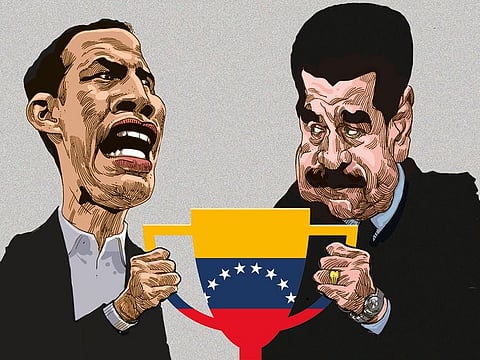How the world can help Venezuela
The country needs to build a path toward understanding and reconciliation

On January 23, 61 years after the vicious dictator Marcos Perez Jimenez was ousted, Venezuelans once again gathered for a day of democratic celebration.
Perez Jimenez was fraudulently elected by a Constituent Assembly in 1953. His term was scheduled to expire in 1958. But rather than call for free-and-transparent presidential elections, he was undemocratically re-elected after holding a plebiscite on his administration late in 1957. Following widespread protests and a rupture within the military, Perez Jimenez left the country, and Venezuela regained its freedom on January 23, 1958.
Once again we face the challenge of restoring our democracy and rebuilding the country — this time amid a humanitarian crisis and the illegal hold on the presidency by Nicolas Maduro. There are severe medicine and food shortages and health systems have collapsed. We have one of the highest homicide rates in the world, which is aggravated by the government’s brutal crackdown on protesters.
This tragedy has prompted the largest exodus in Latin American history, with three million Venezuelans now living abroad.
Maduro’s re-election on May 20, 2018, was illegitimate, and has been acknowledged as such by much of the international community. His six-year term was set to end on January 10. By continuing to stay in office, Maduro is usurping the presidency.
My ascension to interim president is based on Article 233 of the Venezuelan Constitution, according to which, if at the outset of a new term there is no elected head of state, power is vested in the president of the National Assembly until fair elections take place. This is why the oath I took on January 23 cannot be considered a “self-proclamation.” It was not of my own accord that I assumed the presidency, but in adherence to the constitution.
I was 15 when Hugo Chavez came to power in 1998. At the time I lived in Vargas state, which borders the Caribbean. In 1999 torrential rains caused flooding that left thousands of people dead. I lost several friends.
The importance of resilience has been etched into my soul ever since. I saw that if I wanted a better future for my country I had to roll up my sleeves and give my life to public service.
Soon I became involved in local politics and was elected to serve as a deputy representing Vargas state in the National Assembly in 2015.
The same generation of brothers and sisters from my student movement days stands alongside me today, as Venezuelans from across the political spectrum are coming together in an effort to re-establish democracy. It is incumbent on us to reinstate normality, in order to build the advanced and prosperous country of which we all dream. But first we must recover our freedom.
A pattern has developed under the Maduro regime. When pressure builds, the first recourse is to repress and persecute. I know this because buckshot pellets fired by members of the armed forces — at peaceful protesters in 2017 — remain lodged in my own body. A minor price to pay compared to the sacrifices made by some of my compatriots.
Under Maduro, at least 240 Venezuelans have been murdered at marches, and there are 600 political prisoners, including the founder of my party, Leopoldo Lopez, who has been a prisoner for five years. When repressive tactics prove futile, Maduro and his henchmen disingenuously propose “dialogue.” But we have become immune to such manipulation. The usurpation of power was their only remaining option.
Given that the Maduro regime cannot legitimately retain power, our strategy is threefold: First, shore up the National Assembly as the last bastion of democracy; second, consolidate the support of the international community, especially the Lima Group, the Organisation of American States, the United States and the European Union; and third, make our case to the people, on the basis that they have a right to self-determination.
More than 50 countries have recognised me as interim president or the National Assembly as the legitimate authority in Venezuela. I have begun the process of appointing ambassadors and locating and recovering national assets tied up abroad.
Among opposition politicians, we have come up with three points of agreement as part of our road map to democracy: an end to the usurpation; a transitional government; and free elections.
The transition will require support from key military factions. We have had clandestine meetings with members of the armed forces and the security forces. We have offered amnesty to all those who are found not guilty of crimes against humanity. The military’s withdrawal of support from Maduro is crucial to changing the government, and the majority of those in service agree that the country’s recent travails are untenable.
There is broad consensus among Venezuelans in favour of change: Eighty-four per cent of the people reject Maduro’s rule. We have been holding town hall meetings across the country so people can talk openly about this political moment.
Last week in Caracas, citizens from poor neighbourhoods that had been Chavista strongholds took to the streets in protests. They went out again on January 23 with the full knowledge that they might be brutally repressed.
In order to manage Maduro’s exit with minimum bloodshed, all of Venezuela must unite in pushing for a definitive end to his regime. We need the support of pro-democratic governments, institutions and individuals the world over. It is imperative that we find effective solutions for the humanitarian crisis, just as it is to go on building a path toward understanding and reconciliation.
Our strength, and the salvation of all Venezuela, is in unity.
— New York Times News Service
Juan Guaido is the president of the Venezuelan National Assembly and an opposition leader.


